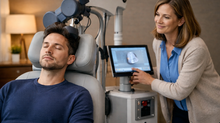Thoughts about COVID
- Dr. Gary Warstadt
- Jan 31, 2022
- 4 min read
Updated: Jun 1, 2022

We at Southeastern Psychiatric Associates recognize there is an overabundance of information about COVID-19 out there, and that it can be hard knowing who we should listen to, who to trust. For those of you who would like to hear this doctor’s take on it, here are some thoughts.
SCIENCE AND DECISION MAKING
I do trust that scientists, doctors, and researchers are as well-meaning, unbiased, and knowledgeable a source of information as can be had. They do not have a stake in misleading the public. They are trained to gather evidence and follow it wherever it may lead. In our medical training, doctors have it drilled into us to let the scientific evidence take us as far as it can, before we turn to educated guesses, anecdotes, or gut feelings.
Scientists can tell us how confident they are in their conclusions. When there is a strong consensus among these experts, I believe should become our current belief. Science is always questioning itself, and that is a good thing. New information or new thinking may change the current best thinking, but changes should be based on evidence. The existence of changeability should not give anyone license to merely substitute their opinion.
Medical decision-making almost always deals with degrees of fuzziness: what percent of people respond to a treatment? what is the likelihood of an adverse effect? It is notabout black and white questions such as, “Does it work or doesn’t it?”
The presence of an adverse effect is only the beginning of the analysis. Next comes, how serious is the adverse effect? what percent of people get that side effect? what is the magnitude of the benefit of the treatment? what percent of people will see that benefit? what are the consequences of not being treated? and what is the likelihood of those consequences? Also, how much time and how many subjects do we need in the studies to ensure we can sufficiently weigh all the above?
Epidemiologists and public health experts are all about that way of thinking; they live and breathe it.
In the end, it is the government that has to make policy decisions, and especially with such a polarized country, this means at any given time, a lot of people do not trust the government. But if there is already a scientific consensus, I find that very reassuring.
Since policy decisions involve balancing one set of priorities versus another, the government (CDC, FDA) assembles panels of experts to advise it on all treatment decisions. The idea is, a strong consensus among the panel members implies we all should strongly consider that to be the way to go, while a split decision leaves more room for different approaches.
While this process is not perfect, it is the best one that thoughtful people have come up with.
WHAT THE EXPERTS AGREE UPON
COVID is not just a cold, although Omicron is increasingly looking less severe than its predecessors.
An unprecedented proportion of the population is currently or recently infected.
Vaccinated and unvaccinated people can contract Omicron.
Unvaccinated people are 5X more likely to get infected and 13X more likely to become seriously ill. So, the vaccine gives you a good degree of protection from getting sick, and excellent protection from getting hospitalized or dying. But not complete protection; no vaccine offers complete protection.
Based on a huge data set from the entire National Healthcare System of Israel, the incidence of serious side effects from the vaccine is vanishingly low. You are literally more likely to get hit by lightning.
We have a wealth of data on risks, vaccine safety, side effects, and benefits at this point. If waiting for more data was necessary, the experts would have said so, and they have not. Furthermore, side effects almost always happen in the first few days after a treatment. Things that take months or years are extremely uncommon, while the threat of COVID is here and now.
The benefit from the vaccination seems to wear off gradually, but boosters bring it back up a lot.
Therefore, the strong consensus of the experts is that, with few exceptions, everyone should get the vaccine and the boosters.
The virus is predominantly spread by small airborne droplets.
Therefore, a good mask is the best way to protect yourself when you are around people.
N95s, KN95s, and KF94 masks are 2-3X more protectivethan blue surgical masks or cloth masks, even with filters. These are now abundant, cheap, and easily obtained online.
There are counterfeit masks out there, KN95s in particular. The New York Times reports that for KN95s, the Powecom brand is NIOSH approved; 3M makes KN95s too. https://www.nytimes.com/article/covid-masks.html?referringSource=articleShare
Air flow makes a difference. That’s why being outdoors is safer. An open window, an indoor air filter, or an oscillating fan can reduce risk if you are indoors with friends and family.
There is just no evidence of sterility or birth defects from the vaccine, nor is there any reason to think there would be, based on the mechanism of action of the vaccines.
MY 2 CENTS
Unfortunately, as we’ve seen over the holidays, your friends and family may well be more of a source of infection than the person in line in front of you in the grocery store, because you are more likely to spend a long time close to them unmasked. But we recognize you love them and have a human need to be with them. Consider opening a window or using a fan if you don’t want to mask up with friends and family members. Stay negative, my friends!
Gary Warstadt, MD














































Comments